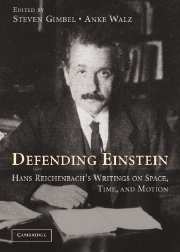Book contents
- Frontmatter
- Contents
- Introduction
- 1 Review of Moritz Schlick's General Theory of Knowledge
- 2 Einstein's Theory of Space
- 3 Reply to H. Dingler's Critique of the Theory of Relativity
- 4 A Report on an Axiomatization of Einstein's Theory of Space-Time
- 5 Reply to Th. Wulf's Objections to the General Theory of Relativity
- 6 Einstein's Theory of Motion
- 7 The Theory of Relativity and Absolute Transport Time
- 8 Reply to Anderson's Objections to the General Theory of Relativity
- 9 Review of Aloys Müller's The Philosophical Problems with Einstein's Theory of Relativity
- 10 The Philosophical Significance of the Theory of Relativity
- 11 Planet Clocks and Einsteinian Simultaneity
- 12 On the Physical Consequences of the Axiomatization of Relativity
- 13 Has the Theory of Relativity Been Refuted?
- 14 Response to a Publication of Mr. Hj. Mellin
- Index
10 - The Philosophical Significance of the Theory of Relativity
Published online by Cambridge University Press: 09 November 2009
- Frontmatter
- Contents
- Introduction
- 1 Review of Moritz Schlick's General Theory of Knowledge
- 2 Einstein's Theory of Space
- 3 Reply to H. Dingler's Critique of the Theory of Relativity
- 4 A Report on an Axiomatization of Einstein's Theory of Space-Time
- 5 Reply to Th. Wulf's Objections to the General Theory of Relativity
- 6 Einstein's Theory of Motion
- 7 The Theory of Relativity and Absolute Transport Time
- 8 Reply to Anderson's Objections to the General Theory of Relativity
- 9 Review of Aloys Müller's The Philosophical Problems with Einstein's Theory of Relativity
- 10 The Philosophical Significance of the Theory of Relativity
- 11 Planet Clocks and Einsteinian Simultaneity
- 12 On the Physical Consequences of the Axiomatization of Relativity
- 13 Has the Theory of Relativity Been Refuted?
- 14 Response to a Publication of Mr. Hj. Mellin
- Index
Summary
Introduction
Although there is still resistance to the theory of relativity, it should be pointed out that this resistance is founded upon conceptual objections. It is beyond dispute that the theory is physically useful, that its assertions are well verified by observable phenomena. What opponents of the theory find problematic are the ideas upon which the theory is founded. On the other hand, it is precisely these ideas that the defenders of the theory hold to be its greatest achievement and in which they claim to find the true significance of Einstein's work. It is therefore of interest to study the formation of these ideas, their content and their significance.
We begin by rejecting two ineffective objections. The theory has been criticized for contradicting ordinary common sense. It is necessary to concede that this is true, but we refuse to see this as a criticism because a theory like this, which provides an analysis of the most profound abstract ideas, will necessarily contradict certain naïve intuitions from everyday life. We do not discount the value which is attached to this simplicity of understanding, but a mentality adapted to the practical needs of existence (and is ordinary common sense anything else?) cannot be required to possess the proper critical faculty of a theory of knowledge: “The chisels and hammers are fine for working a piece of wood, but to engrave you need an engraver's needle,” these words in Kant should not be far from view whenever one wants to contradict the theory of relativity with elementary objections.
- Type
- Chapter
- Information
- Defending EinsteinHans Reichenbach's Writings on Space, Time and Motion, pp. 95 - 160Publisher: Cambridge University PressPrint publication year: 2006

